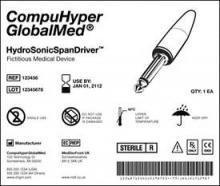Most medical devices distributed in the United States should carry an identification label to help identify and resolve problems associated with them, according to a statement issued the Food and Drug Administration on July 3.
The unique device identifier (UDI), an exclusive numeric or alphanumeric code, "has the potential to improve the quality of information in medical device adverse event reports, which will help the FDA identify product problems more quickly, better target recalls and improve patient safety," according to the statement.
In the proposed rule, the label will include an illustration of the device, the product name, its expiration date, reference and lot numbers, manufacturer information, as well as a bar code.
The UDI system is required by legislation passed by Congress in 2007 directing the agency to develop regulations establishing such a system, and the agency worked closely with industry, clinical groups, as well as patient and consumer groups, and has conducted four pilot studies in developing the proposed rule, according to the statement.
Implementation will be phased in, with the highest-risk medical devices labeled first. Low-risk devices will be exempt from some or all of the requirements and over-the-counter devices will be exempt, since they usually have a universal product code.
In addition to improving the accuracy of device-related adverse event reporting, the system is expected to expedite the resolution of device-related problems. The system also will address counterfeit products and medical emergency preparation.
The FDA is accepting comments on the proposal for 120 days.


